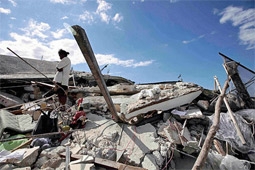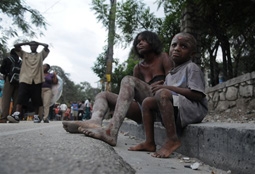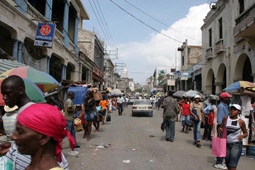
The deadly 7.0 earthquake that shook Port-au-Prince, Haiti, a nation already mired in debt and poverty, inspired ONE, a grassroots campaign and advocacy group, to focus on Haiti’s future. Over 150,000 ONE members took part in their “Drop Haiti’s Debt” campaign which calls for the cancellation of Haiti’s one billion dollar debt.
We cannot expect eradication of debt to solve all problems in Haiti, a nation with more NGOs per person than any other country besides India. However, if debt cancellation will provide Haiti with the clean slate it needs to slowly rebuild without looking back, it could be a petition worth pushing.
On Tuesday, January 26, 2010 The ONE Campaign hosted an interactive conference call featuring former Senate Majority Leader and surgeon Dr. Bill Frist, Dr. Joia Mukherjee from Partners in Heath, David Meltzer from the American Red Cross, and Representative Gregory Meeks, an advocate for debt relief.
ONE’s president, David Lane, led the conference and explained, “We’ll be focusing on the situation on the ground, the humanitarian response, as well as the long-term developmental efforts needed to help the Haitian people get on the poverty-fighting track.”
ONE’s goal: to obtain 200,000 signatures on their petition to U.S. Treasury Secretary Timothy Giethner. “With debt relief, we can lay a foundation for a lot of other things that need to happen,” Lane said. “Giethner and the other members who sit on the board of the IMF, control debt and have the power to provide grants, not loans.”
Haiti owes $447 million to the Inter-American Developmental Bank, $295 million to Venezuela, and $156 million to the International Monetary Fund. Lane and Representative Meeks believe that with the erasure of these debts and the issuance of grants rather than loans, Haiti can successfully lead its own recovery.
David Meltzer, Senior Vice President for International Services for the American Red Cross recently returned from a trip to Haiti. He described his first impressions. “You get outside the airport and are struck by sights, sounds, and smells. Television cannot convey the breadth of destruction. You smell rotting garbage, dead people, and human waste. Right now, Haiti doesn’t have much in the way of life, noise, or music. It is a markedly changed city.”
With one international airport and limited infrastructure, Haiti struggles to bring aid to its suffering people. Meltzer considered the country “challenged” even before the quake. Now, with shortages of fuel, trucks, and supplies, a trip overland takes 18 hours due to roads congested with relief supplies.
The latest American Red Cross figures estimate 170 million dollars for the relief effort. “Relief agencies are pouring in supplies as fast as Haiti can absorb them,” Meltzer said. “We’re dealing with an extremely challenging environment.”

Food, water, and shelter are the Red Cross’s main priorities. Meltzer noted that more than two million people lack food and 800,000 to one million Haitians lack shelter. The Red Cross partnered with the World Food Program and gave 30 million dollars to feed 500,000 people with ready-to-eat meals for one month. Meltzer lamented, “We’ve got to find ways to get the food into Haiti.”
The relief and rebuilding phase will face another hurdle when the Haitian rainy season begins in April. “The challenges were immense before the earthquake and now they are staggering,” Meltzer said.
Senator Dr. Bill Frist, a surgeon and Senate Majority Leader, continued the dialogue about the unique difficulties of this disaster while focusing on the medical aspects of the relief effort. Unlike Hurricane Katrina and the Indian Ocean tsunami of 2004, earthquake injuries involve crushed, broken bones and thus require surgery. “You have to think totality, and not just medical intervention and supplies,” Dr. Frist explained. “If we don’t have clean water when we’re doing surgery, we’re in real trouble.”
Dr. Frist told the story of a young girl’s survival. Trapped below six feet of rubble after her school shattered to the ground, the girl waited and prayed for a rescuer. Her father recognized her voice amidst the rubble and spent two and a half days using a pick to free her from the debris.
Unfortunately, many Haitians are not lucky enough to tell tales of survival. The compromised water system, desperate need for surgical expertise, and clogged transportation system make it difficult for the injured to gain access to the care they need. “Even if you get supplies in, the lack of petrol, roads, and trucks makes it hard to distribute aid. The infrastructure is an additional impediment. The first few days were very chaotic. Great progress is being made, but there is clearly a lot of suffering.” Dr. Frist urged investment in agriculture, roads, and water supply to help Haiti rebuild.
Dr. Joia Mukherjee, the Medical Director for Partners in Health, also considered additional sources of Haiti’s challenges. She explained, “Haiti is a country I absolutely have fallen in love with. It is not a poor country; it is an impoverished country because of its history.” She does not deem Haiti progress-resistant; rather, she thinks Haiti’s weaknesses stem from its economic isolation.
Dr. Mukherjee described Partners in Heath’s relief tactics. “Our organization recognized the only way to bring any response is a two-pronged approach. First, we want to enable the public sector to do the jobs they want to do and have been mandated to do. Second is to organize and mobilize civil society to participate in the progress of health.”
To what extent should outside nations intervene in the Haitian rebuilding process? Can we assume that with the right resources and the cancellation of debt, Haitian leaders can pull their nation back together again?
David Meltzer thinks Haitians must be empowered to take ownership in order to help themselves. “You must listen to the community, see what the people need, and see how they can contribute. You can’t come in and tell everyone what to do and how to rebuild,” Meltzer added. We must hope that internal conflict or anger against outsiders will not further weaken Haiti.

Representative Meeks championed Haiti’s need for debt cancellation. “We need to free up resources and be prepared for the long haul,” Meeks explained. “We need careful coordination between governmental and non-governmental organizations focusing on Haiti. We want to remind everyone of what the effort was to rebuild Europe after World War II. It takes coordinated aid and development.”
The World Bank announced that it will waive Haiti’s debt payments for five years and the IMF will give interest-free loans until 2011. However, Meeks said during the conference, “It is important that Haiti’s debt should be cancelled immediately. Any money going forward should not be loans.” Unlike grants, loans given to Haiti must be paid back.
Handing money to Haiti will certainly advance the rebuilding process, but monetary donations cannot ensure appropriate allocation of funds. Perhaps that is why last year, Haiti’s request for debt cancellation failed to come to fruition. Meeks said, “Haiti didn’t get debt cancellation last June because of chance. We must make sure the finances are coordinated so that debt will not prevent Haiti from rebuilding.”
ONE’s conference addressed not only Haiti’s immediate necessities - providing food, water, shelter, and medical supplies - but also discussed how the nation can rebuild itself post-earthquake. Representative Meeks concluded, “We want to focus on long-term building for Haiti so that it can rise, Phoenix-like, to become the nation that it should be.”
To sign ONE’s petition for debt cancellation, visit one.org/haiti or contact a regional field director in your area.
